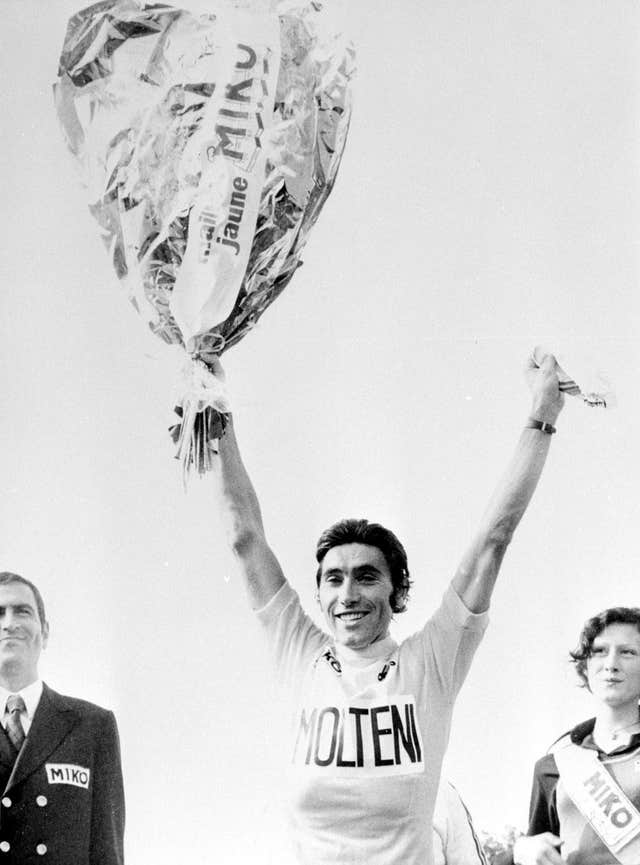
Sir Mark Cavendish has broken the Tour de France stage wins record with victory in Saint-Vulbas moving him clear of the great Eddy Merckx on 35.
The 39-year-old had postponed his planned retirement for an extra season after a crash cut short what was supposed to be his final Tour last summer, and has claimed the reward he wanted most.
Here, the PA news agency looks at Cavendish’s road to glory, and what his achievement means.
How has he got here?
🏆 HE’S DONE IT!!! @MarkCavendish 35th win in the Tour de France!!!
🏆 IL L’A FAIT !!! @MarkCavendish remporte sa 35ème victoire sur le Tour de France !!!#TDF2024 pic.twitter.com/Ad1cy9dWXQ
— Tour de France™ (@LeTour) July 3, 2024
After a short-lived Tour debut in 2007, Cavendish started winning a year later and the victories came in floods. He took four in 2008, six in 2009 and five each in 2010 and 2011 as the HTC-Columbia team made the sprint stages look like a formality.
It was conceivable to think the record might be coming in just a few years’ time but Cavendish’s strike rate dipped as new rivals emerged and crashes hampered his progress. A return to form saw him win four stages in 2016, but there followed several years impacted by illness and injury culminating in non-selection in 2019 and 2020.
His career was conceivably over going into 2021, left without a contract until Deceuninck-QuickStep offered a lifeline and he returned to win four stages. He needed another last-minute deal to race the 2023 Tour with Astana-Qazaqstan, but a stage-eight crash denied him the chance to make history, so he postponed retirement to try again.
Should we have expected this?

Cavendish has been written off before and proven everybody wrong, but to simply say he has done it again underplays this achievement. The latter years of his career have thrown up major hurdles time and again – the Epstein-Barr virus dogged him for two years and contributed to a bout of depression.
He returned to Deceuninck-QuickStep in 2021 having not recorded a win of any kind since February 2018, and only went to the Tour after an injury struck Sam Bennett.
His four stage wins were the stuff of Hollywood movies, but he was not selected for the 2022 Tour, and then needed Astana-Qazaqstan to bring him in late on after the collapse of the team he had been due to join. Throw in last summer’s crash and the postponed retirement, and none of this has been straightforward to say the least.
What does beating Merckx’s record mean?

Merckx was a very different rider in a very different time as many, including Cavendish himself, would be quick to point out.
The Belgian’s stage victories helped him to win the race overall five times in the late 1960s and 70s, holding the record equally with Bernard Hinault, Jacques Anquetil and Miguel Indurain.
Merckx is, by pretty much any measure, the greatest cyclist who ever competed, ‘the Cannibal’ who devoured his opponents and won a staggering percentage of the races he entered on any terrain. Cavendish would not claim to be his equal, but that merely emphasises the achievement of beating any record Merckx ever set.
Will this ever be challenged?

Never say never, but it is safe to say it will not happen any time soon. On the list of active riders, next after Cavendish comes Tadej Pogacar and the soon-to-retire Peter Sagan all the way back on 12.
Pogacar matched Sagan with his win on stage four and few would bet against him adding to his tally before the race reaches Nice.
Still only 25 and with an insatiable appetite for racing that many compare with Merckx, the Slovenian could be the man to one day do it, but there is a very, very long road ahead if he is to make it.


Comments: Our rules
We want our comments to be a lively and valuable part of our community - a place where readers can debate and engage with the most important local issues. The ability to comment on our stories is a privilege, not a right, however, and that privilege may be withdrawn if it is abused or misused.
Please report any comments that break our rules.
Read the rules here